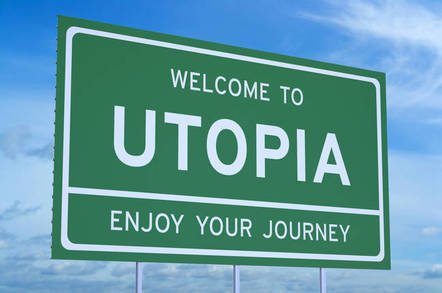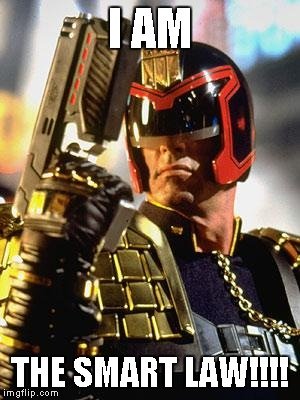What if I told you that blockchain-based DAO can really exist?

Hi there, Steem!
It would be so ambitious to build a project of entire nation defined not by geography, but by the set of rules and benefits of "citizenship on the blockchain" (universal basic income included!). What kind of benefits? How about Universal Basic Income or Smart Laws? Maybe a sustainable governance policies will be interesting for you to become a citizen? Transparent elections, maybe?
What kind of cool features could this DAO consist?
Universal basic income (UBI).
Utopia, digital socialism or just the answer to automation ?
Progress of the humankind is a steamroller which starts to move really fast. Self-driving cars and truck will take away a lot of jobs. Accountants, bankers, financial specialists, IT-crowd, supply chain managers - all of them will meet someday their automated substitutes. That's sad but inevitable.

Imagine a nationwide DAO where all government processes are organized on the blockchain with the third-party fully eliminated - trillions of dollars will be set free just because of just not getting in pockets of the parasitic artificial businesses, existence of which is just prescribed by the law.
But what to do with this amount of potentially money saved? How it should be distributed?
Some blockchain-based DAO has covered all your costs (or just paid 1000$+ USD in a month) - would you still go to work? What would you do? Would you no work at all? Maybe it's time to reduce working hours to continue the education?
UBI is the most ambitious social policy of modern times and it becomes more and more imaginable with crypto marching on the planet and it seems to be a good alternative to welfare since it will help to eliminate bureaucracy (extra money saved). The combination of a welfare and UBI could even result a work to become optional!
Basics of the UBI:
1. What is UBI?
UBI is a fixed amount, at a level sufficient for subsistence, given by a state to all citizens regardless of income or work status.
2. How is UBI distributed
Most of basic income proposals suggest that purchasing power be distributed at scheduled intervals - a week, a month, or even a year.
3. How much should be given
As much as it takes. Average proposals hover around 10 000 USD annualy, but the exact amount varies. From 2600Euro in Switzerland, while Kenya testing a 10 000 in a year.
4. How much would it cost?
In a country like the United States it will cost about $3 trln to distribute a 10 000$ UBI to all citizens. If you made exclusions for children, households earning more than 100 000$ and retirees receiving Social Security, that number would fall to 1,5$ trln.
5. How would governments pay for it?
Due to inherent scale of a universal income, funding would likely come from variety of sources. Carbon taxes, income taxes, VAT, negative interest rates, earnings from investments, military spending decrease, all resource-based revenues are all being explored.
6. What pros and cons for UBI?
The most substantial benefit would be the elimination households living below the poverty line, which would afford everyone a base level of income security. Many believe it will also result in an explosion in creativity, entrepreneurship, and research. Some even see UBI as a way to distribute the gems of technological advancement fairly.
Many opponents of UBI believe an unconditional benefit would disincentivize productivity and work, though early experiments have shown these concerns are largely unsubstantiated. Others fear that governments around the world will not be able to secure the funds to affrod UBI in perpetuity. Finally , some argue a global benefit could result in inflation.
7. Is it already implemented somewhere?
Trial projects are currently being undertaken in the Netherlands, Kenya, India, Switzerland, Finland, UAE.
Case studies
Alaska's story
Alaska has been implementing its own brand of basic income since 1982. It's called the Permanent Fund Dividend (PFD) which is derived from earnings on investments of the Alaska Permanent Fund (APF), a portfolio of diversified assets. Market fluctuations affect APF investments, so the amount given to Alaskan residents also vary.
Since implementation:
- Spending and saving regularly increase around the time the dividends
- Increase in purchasing power has resulted in 10 000 additional jobs for the state
- Poverty rate among Native Americans fell from 25% to 19% between 1980 and 1990
- Only one percent of Alaskans report that they work less because of the dividend
Harper Lee's story
In 1956, a struggling writer named Harper Lee received an envelope from family friends with a years salary in it.
"You have one year off your job to write whatever you please", - it said.
She would use her time to pen "To Kill A Mockingbird". While not a universal basic income by definition, this story is a showcase of the creativity that can result from income security.

I MEAN SOMETHING REALLY USEFUL, AS VITALIK TOLD
The Smart Law.

Everyone heard or read about smart contracts. But what if we try to applicate these principles on the law branch?
Smart law is an algorithm (scenario) in which the conditions necessary for ascribing
attributes/relations to objects of the law (legal and natural persons) or for performance of certain actions with these objects are established.
For example, a smart law may determine the conditions of establishment of relationship "married" between two citizens of the state or conditions of transaction "tax payment". Some smart laws (for example, tax laws) work in a tracking mode – they record execution of transactions of a certain type and automatically perform statutory action (tax deduction).
Other smart laws (for example, marriage smart law) are triggered when they are accessed through special forms and are performed interactively. After checking all the conditions set out in them, these smart laws complete their action by ascribing attributes/relations to new objects or refusing to do so.
Economic smart laws control both how smart contracts are created and how they are executed, thereby automatically prohibiting the inclusion in them of operations that contravene the law. Introduction of smart laws (in addition to the financial system and registry structure) therefore completes the creation of a common information space for full and efficient operation of smart contracts.
All state laws whose subjects are objects listed in the blockchain registries are transferred into smart law format. Transfer of state laws into smart law format does not require the involvement of programmers – a special interface is used. Earlier-adopted laws come into effect in the space in the form of smart laws after signing them with electronic keys belonging, for example, to the heads of the legislative and executive bodies of the state. New laws can be created and tested right in the blockchain space.
A new smart law is adopted and comes into force once signed with the required number of electronic keys of representatives of the legislative body of the state. A special smart law establishes the percentage of votes required for the adoption of laws. Special smart laws prescribe the duration and conditions of legislative elections, they accept applications from candidates, launch the voting procedure and count the votes. Voting by means of electronic keys is quick and incurs minimum cost. Voting results, that are stored in the blockchain, are practically impossible to be tampered with.
Smart laws are directly effective laws. Implementing them does not require intermediaries or
regulatory authorities. Amendments and changes made to them take effect immediately. Many of the functions of state bodies – most notably registration of civil status (birth, marriage, divorce), taxation, regulation of financial and business relations – are automatically executed and controlled by smart laws.
Summary:
Full transition of government to the blockchain-based governance system would:
· Tremendously reduce documents circulation in the public, social and economic spheres;
· Make the provision of public services convenient and fast;
· Allow the real-time analysis of social, political and economic processes;
· Almost eliminate expenses on monitoring and registration authorities;
· Make the government activity more transparent and accessible for accounting and control,
which will enhance its efficiency and lead to significant reduction in corruption and shadow
economy;
· Offer new methods of combating crime.
Combination of a full range of registries, financial, legal and economic systems in a common information space would open up new business opportunities:
· Would simplify the process of registration, licensing, insurance, and approval of business
loans;
· Would minimize the need for accounting and legal services;
· Would enhance transaction safety;
· Would eliminate a great number of intermediaries;
· Would radically reduce transaction costs, particularly in international trade.
For citizens, blockchain-based governance system would:
· Automate the process of receiving public services;
· Protect personal data from other citizens, as well as from unauthorized access by certain state
structures;
· Eliminate the need to obtain, maintain and provide paper documents;
· Lower the cost of many services due to the p2p (person-to-person) services eliminating
intermediaries: mutual crediting, ordering a taxi, hotel reservations, buying flight tickets, etc.;
· Raise the level of medical care thanks to full account of all medical records, prescriptions,
procedures and so forth.

UBI can only work if cryptocurrencies replace fiats!
Downvoting a post can decrease pending rewards and make it less visible. Common reasons:
Submit
UBI won't work in our old system, it's true! Too much intermediaries...
Downvoting a post can decrease pending rewards and make it less visible. Common reasons:
Submit
Thanks for blogging about the idea of basic income! FYI, there's the #basicincome hashtag for it, in case you weren't aware.
Also, I agree that blockchain tech can be used to automated quite a lot of government, including taxes.
Downvoting a post can decrease pending rewards and make it less visible. Common reasons:
Submit
Thanks a lot for info, already changed the tag. I'm advocating UBI everywhere and will continue. There is so much to do and to discuss!
Downvoting a post can decrease pending rewards and make it less visible. Common reasons:
Submit
Could really reduce some headaches if you ask me, but could just as easily create some... pretty interesting stuff here @equites really digging some of your recent posts, keep it up my man
Downvoting a post can decrease pending rewards and make it less visible. Common reasons:
Submit
Thanks! Stay tuned for more!
Downvoting a post can decrease pending rewards and make it less visible. Common reasons:
Submit
Most definitely :-)
Downvoting a post can decrease pending rewards and make it less visible. Common reasons:
Submit
Even if on one hand the UBI sounds like the solution to stop poverty (and it probably is).
My question would be: What means a UBI for a society raised by working 40 hours?
Is it that simple to just pay people for not working or does the mindset/consciousness have to be changed before?
In my opinion the problem for monetary inequality is the way we consume. It is not about how can my consumption please me and my neighbour. Most of the time it is about feeding greed without thinking about how our consumption influences the world around us.
When Im spinning the idea of UBI in my head I see a western world even more attached to big corporations that create and fill the wants of a sick society. The money wont go where it benefits the one who need it. It will stay in the cycle of big corporations.
Just my two cents. Thanks for the depth article!
Downvoting a post can decrease pending rewards and make it less visible. Common reasons:
Submit
I agree somehow, UBI and all the stuff is utopia just to dream about, and is unreachable even in 30 years.
Downvoting a post can decrease pending rewards and make it less visible. Common reasons:
Submit
We didn't always consider 40 hours as "full-time." Imagine going back in time to that discussion. Would you ask the same question of a society used to working 60 hours?
Downvoting a post can decrease pending rewards and make it less visible. Common reasons:
Submit
Of course, it is even thinkable just because of the golden age of tech and socialism-based approaches.

say hello to UBI, duh
Downvoting a post can decrease pending rewards and make it less visible. Common reasons:
Submit
@basicincome I made my daughter and me member of basicincome, because that was nice I again wrote me in and a friend. But the last days we do not see any upvotes anymore? What did I miss?
Downvoting a post can decrease pending rewards and make it less visible. Common reasons:
Submit
UBI can be done with a neverstopping ICO which sets floor and ceiling price of crypto asset backed currency ceiling-floor can be distributed as ubi to coin holders or whoever u want
ICO or BANK will always sell and buy at CP & FP keeping price fluctuation at bay.
Downvoting a post can decrease pending rewards and make it less visible. Common reasons:
Submit
Call me old fashioned but I still think hard work is what our country needs not another free handout
Downvoting a post can decrease pending rewards and make it less visible. Common reasons:
Submit
Sure, but the eobots won't ask whom to replace)
Downvoting a post can decrease pending rewards and make it less visible. Common reasons:
Submit
Very Good!!!
Downvoting a post can decrease pending rewards and make it less visible. Common reasons:
Submit
Hello my dear. I like you blog and FOLLOW Upvote . ! Thank you Please check my blog if you like please upvote sir
https://steemit.com/dtube/@byltc/planted-desert-terrarium-2018
Downvoting a post can decrease pending rewards and make it less visible. Common reasons:
Submit
I like @equites i follow and i likee :) upvoted
Downvoting a post can decrease pending rewards and make it less visible. Common reasons:
Submit
This post has received gratitude of 6.39 % from @appreciator thanks to: @equites.
Downvoting a post can decrease pending rewards and make it less visible. Common reasons:
Submit
You said it all , and that's the truth, thanks for the information I really Lent a lot,keep steeming hot.
Downvoting a post can decrease pending rewards and make it less visible. Common reasons:
Submit
"You could change the flow of money with a UBI (universal basic income), but in the end it probably won’t work because you have to tax people after you’ve already handed out the cash. That means you have to take it from people who already have it, which means you face resistance." Daniel Jeffries
Downvoting a post can decrease pending rewards and make it less visible. Common reasons:
Submit